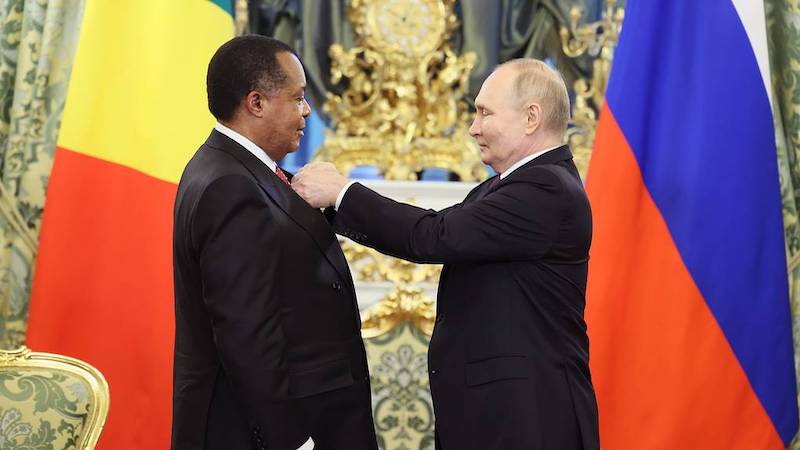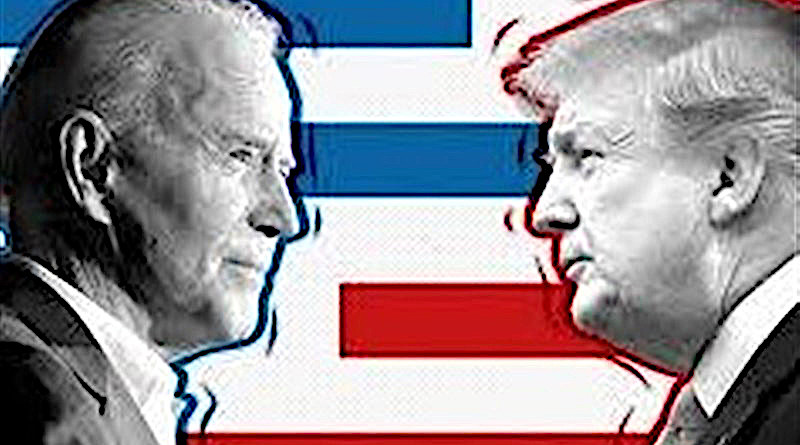

Republic of Congo President Denis Sassou-Nguesso, unlike majority of African leaders who have maintained their neutrality, showered praises for Russia’s ‘special military operation’ against Ukraine during his negotiations over increasing economic cooperation and defense supply with his Russian counterpart Vladimir Putin in the Kremlin on June 27. The ‘special military operation’ in Ukraine has, thus far, divided the world, further set in an economic instability, and with some countries looking forward to participating in reconstruction of global economic architecture away from unipolarity. In one way or the other, the Russia-Ukraine conflict has also provided an impetus for raising Africa’s importance in Russian foreign policy.
Sassou-Nguesso’s official visit, from June 25 to 29, has immense significance for the Kremlin. At least, Congo has raised the number of supporters and ‘friendly’ relations with Moscow. Congolese president was frank in remarks that he was visiting Russia in a complex international context, and at a time when Russia and its people “are acting bravely and resisting the illegal sanctions imposed on your state as a result of the Ukrainian and other conflicts.”
“It is precisely in times of ordeal that we must strengthen and boost our relations. This is the logic of my visit. We would like to hold talks in order to strengthen cooperation in all areas, including the economy, finance, defense, and security,” Sassou-Nguesso said.
At least, Russia and Congo have maintained stable diplomatic relations for more than 30 years after the unexpected collapse of the Soviet Union. In a snapshot assessment, political dialogue has been on track as top diplomats shuttled between Moscow and Kinshasa. The economic cooperation largely lags behind political dialogue, but that seems to change as Russia’s economic interest is currently rising within the context of geopolitical developments. Policy experts strongly suggest that African leaders and corporate business executives, as a contentious model strategy, could take advantage of the contradictions in the changing landscape to indiscriminately forge balanced and profitable relations with both new and traditional partners, the wealthy global players. The principle of participatory and inclusivity be considered as the main basis for multipolarity.
In an explicit acknowledgement, President Vladimir Putin after the talks at the Kremlin awarded (decorated) Denis Sassou-Nguesso with the Order of Honor. The document, published on Kremlin website, says that Sassou-Nguesso has been honored with the award “for his major contribution to boosting and strengthening relations between the Russian Federation and the Republic of the Congo.” The ‘State Decoration of the Russian Federation’ also marked the 60th anniversary of the establishment of diplomatic relations between Moscow and Kinshasa. Russia and Congo have indeed maintained friendly relations and solidarity for 60 years. Historical records show that Sassou-Nguesso several times as a civil servant during the Soviet era, and as president, visited Russia, including participation in the two Russia-Africa Summits held in Sochi and St. Petersburg, and consequently was gifted with a collage of photographs and Pravda newspaper clips documenting these visits.
Congolese leader noted that “African people have experienced a period of growth and gained power in their fight against colonisation and for liberation,” but are still struggling for effective development.; In particular, Congolese authorities are conscious of the huge resources, but for decades, economic growth has been hindered by lack of innovative development approach combined with lack of modern technology.
According to data provided by Putin at the negotiations in July 2023, trade turnover between Russia and Congo soared by 85% in January-April 2023. Overall bilateral trade however is relatively small at about $250 million. Russia exports wheat and petroleum products, while the Congo exports mainly fruits. Congo, like many African countries, has extremely little, or a better description no economic presence in the Russian Federation. Despite the public declarations about trade, economy and infrastructure, Putin or Lavrov hardly commissions completed projects in the continent. Trade has fallen far short of expectations, and the $40 billion target set in documents issued in 2019 in Sochi, southern coastal city of Russia.
Prior to the meeting in the Kremlin, on June 24, the delegation headed by Minister of Foreign Affairs, Francophonie and Congolese Abroad of the Republic of the Congo, Jean-Claude Gakosso, had discussed Foreign Minister Sergey Lavrov issues such as building up partnership in trade, the economy and investment, implementing lucrative joint energy projects, building infrastructure facilities, and developing mineral resources in the Republic of the Congo. In early June, Lavrov was in Guinea, Congo and Burkina Faso – his sixth official visit to Africa since 2022. He held discussions over the same questions relating to economic cooperation in Oyo city, noted that “leading Russian companies, including Lukoil, Yandex, and Rosatom, are working effectively in Congo.” In this context, they noted the importance of a meeting of the Russian-Congolese Joint Intergovernmental Commission on Economic, Scientific and Technical Cooperation and Trade scheduled to be held in September. Concurrently, the ministers also noted that interaction in education and humanitarian contacts was steadily expanding.;
In retrospective series of meetings, particularly one held in May 2010, with the participation of Russian economic operators and local business organizations thoroughly discussed ways to enhance cooperation in areas such as energy, transport, mining and finance. As a result of that joint meeting a cooperation agreement was signed between the chambers of commerce of the two countries, aimed at creating favorable conditions for the development of trade and economic relations between Russia and Congo.;
In terms of education, training of Congolese citizens in Russian universities is steadily developing. In the 2023-2024 academic year, the number of government scholarships for Congo was increased to 250. This is part of the agreement to grant Russia companies complete access to exploring resources. There are also possibilities of recruiting students on commercial (contract) basis to pursue academic courses in universities and institutes in the Russian Federation. That compared, policy experts told this author in separate interviews that China and India (Asia), Europe and United States are highly preferable study destinations for African students, further stressing that middle-class families are attracted by the relative affordability of studying in China, and the prestige of undertaking studies in United States or Europe.;
As part of the comprehensive agenda, the delegation went to St. Petersburg, held a meeting with the city’s governor, Honorary Consul of the Republic of the Congo in St. Petersburg and the Leningrad region. The president delivered a speech at the Academic Council of the National Research University Higher School of Economics in St. Petersburg.
Sassou-Nguesso’s return to the Kremlin to hold talks with President Vladimir Putin over economic and security cooperation, most probably, opened next chapter in the Russian-Congolese bilateral relations. The visit was intended to seek support for long-term security and political stability, and next to review the possibility of turning round Congo’s staggering development into a more viable one. Congo’s estimated 80% of the population still lives in abject poverty, despite the fact that the country boasts huge resources. It has geopolitical allegiance with many external powers.
Research shows that Congo’s oil-driven growth model has reached its limits. Many foreign companies have been eyeing the development of resources there. On May 27, the French energy giant TotalEnergies decided to invest $600 million in 2024 to enhance its exploration and production efforts in the Republic of Congo. The investment would fund exploration and sustain production in the deep offshore Moho Nord field.;
TotalEnergies CEO Patrick Pouyanné has expressed his optimism that the field expected to yield a discovery before the end of 2024. The investment would be used to support exploration and uphold production in the deep offshore Moho Nord field of the country, which produces about 140,000 barrels per day (bpd). This can significantly contribute to reducing energy poverty and promoting industrialization in Congo.
In addition to TotalEnergies’s investment efforts in the country, Sassou-Nguesso has engaged in a game-changing strategy, widening its search for a reliable partner ready to explore its oil reserves, undoubtedly after Russia’s delay in acting on its bilateral agreements which were signed several years ago.
In an interview with TASS News Agency, Sassou-Nguesso underscored the fact that “Russia is an important country, a strategic partner that may play its role in the period when Africa is looking for cooperation in building a new world in the region, building infrastructure, and building new economic and security systems. The African people want to develop their economy and establish themselves in the global arena. Russia may hold a strategic position on this issue.”
Despite the praise given to Russia, the leadership of the Congo has shifted to Russia’s neighbour, Azerbaijan. Azerbaijani President Ilham Aliyev held both tete-a-tete and expanded negotiations with Congolese President Denis Sassou-Nguesso in early April 2024, a statement on the Azerbaijani leader’s website said.
The report monitored by this author indicated that Azerbaijan and Congo signed a package of documents aimed at expanding bilateral cooperation following high-level negotiations in Baku, the capital of Azerbaijan. It therefore implies that the State Oil Company of Azerbaijan (SOCAR) and the National Oil Company of the Congo, by the signed agreement, will jointly, on specified conditions, develop and expand the Congolaise de Raffinage oil refinery. Congolaise de Raffinage specializes in the processing of light oil, its website says. The refinery’s capacity is one million tonnes of oil per year. Production started in 1982.
Both will jointly pursue various projects under the protocol of intent signed between the Ministry of Ecology and Natural Resources of Azerbaijan and the Republic of Congo’s Ministry of Environment and Sustainable Development on cooperation in the fields of the environment, sustainable management of natural resources, and climate change.
Nearly 80% of the population still lives in abject poverty, despite the fact that the country boasts huge resources. The Republic of Congo has become the fourth largest oil producer in the Gulf of Guinea, providing the country with a high degree of potential prosperity despite its internal ethnic conflicts and economic disparity. It has a large untapped mineral wealth and large untapped metal, gold, iron, and phosphate deposits. In 2018, the Republic of the Congo joined the Organization of Petroleum Exporting Countries (OPEC).






